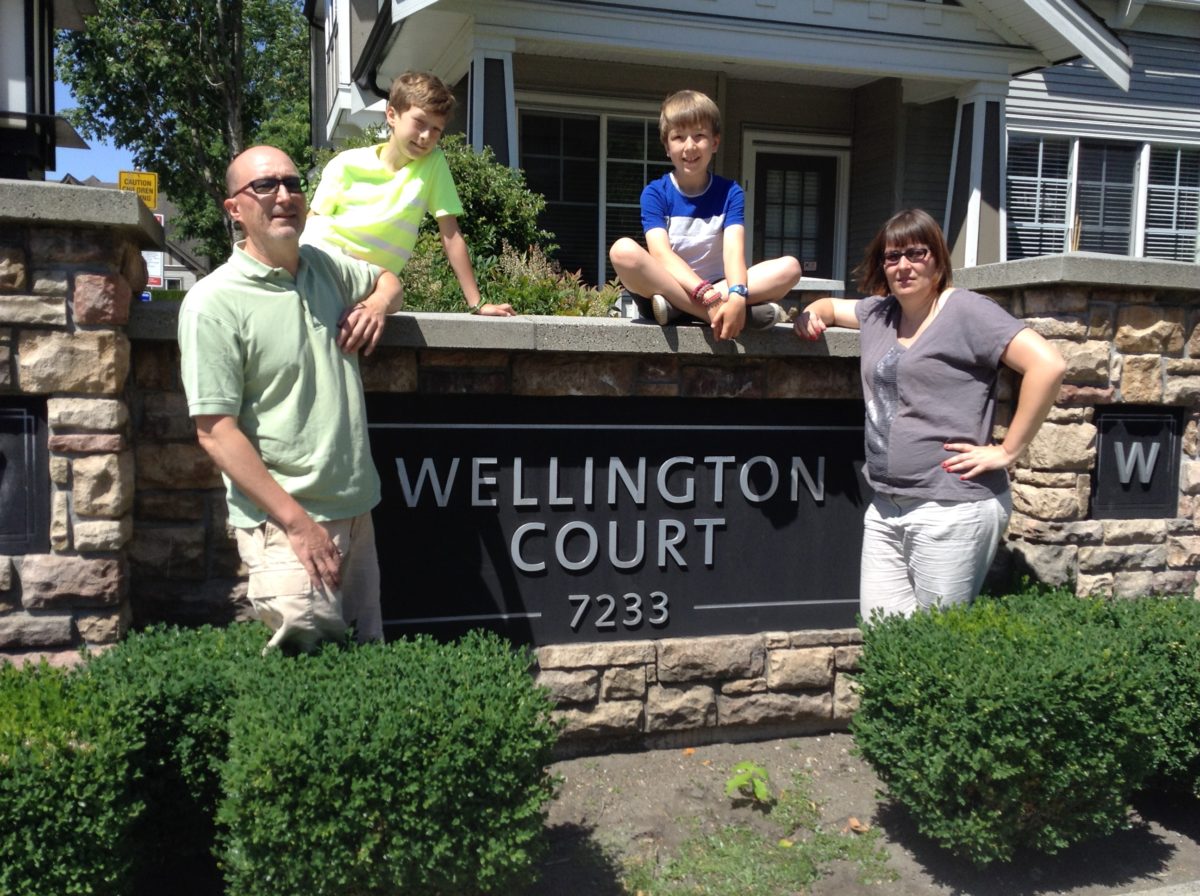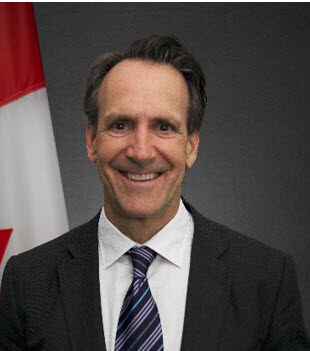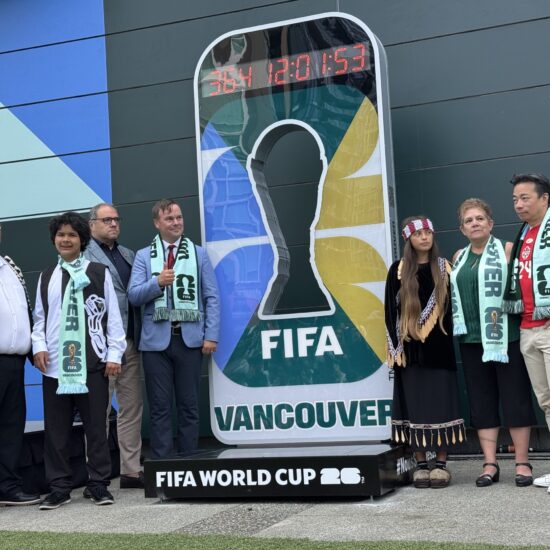
Bob Mackin
A British Columbia Human Rights Tribunal case against a Mandarin-only Richmond strata council has been cancelled after the complainant reached a confidential settlement with the council.
The hearing for Andreas and Dorte Kargut and others had been scheduled to run Oct. 15-19 and Oct. 22-25. They were alleging racial discrimination against the strata council.
“The parties have resolved all outstanding issues,” read a statement from Rose Keith, the Karguts’ lawyer. “The parties will not be disclosing the details of the settlement.”
“We reached a last-minute settlement,” Dorte Kargut told theBreaker. “We are bound by confidentially and non-disparagement. We are looking forward to healing as a family and moving forward.”
Andreas Kargut went public in late 2015 about the Wellington Court strata council shunning those who could speak only English. His complaint, originally on behalf of nine owners at Wellington Court, alleged that the strata council and then-president Ed Mao discriminated against the owners on the basis of their race, by holding strata meetings in Mandarin and allowing the use of proxy voters.

Karguts leave Richmond, summer 2017 (Facebook)
In its submissions to the tribunal, the strata council denied the discrimination allegations. It said it was “more efficient” to do business in Mandarin, the language that all strata council members and a majority of townhouse owners could speak.
Mao resigned shortly after the complaint. Kargut and his family moved in summer 2017 to Vernon.
A preliminary decision last December that allowed the case to proceed noted the dilemma that neither the Strata Property Act nor the Bylaws specify in what language the meeting must be held or the minutes be kept. Before 2014, Wellington Court meetings were held in English only and minutes kept in English. But in successive annual general meetings, Mandarin-speaking owners were voted to council, many by proxy holders.
In a Dec. 13, 2017 written decision, tribunal member Walter Rilkoff rejected the Wellington Court strata council’s application to dismiss the action, and said that the policy to conduct business in Mandarin effectively turned the strata council into a “closed shop.”
“Realistically [it is] not open to non‐Mandarin speakers who wish to be part of the governance of the strata,” Rilkoff wrote. “In turn that can have the longer‐term effect of closing off living in the strata to the majority of people who do not speak Mandarin.”
Rilkoff noted the threshold is low for a discrimination complaint to proceed to a hearing. The complainant need only show that the supporting evidence is not conjecture or speculation.
“This is not a decision that this complaint will succeed. Rather it is that on a preliminary basis, and on the basis of the information before me, I am unable to determine that it has no reasonable prospect of success.”
Rilkoff wrote that a stated purpose of the Human Rights Code is to foster a society in British Columbia in which there are no impediments to full and free participation in the economic, social, political, and cultural life of this province.
“A situation where owners who do not speak a foreign language, but speak one of Canada’s official languages and the lingua franca of this province, are precluded from full participation in the governance of their homes, is not likely to be found to eliminate barriers, but to erect them,” Rilkoff wrote. “Where that distinction is based on what may be appear to be racial or ethnic divisions, the situation may be found to violate the Code.”
The decision said complaints are usually made by a minority or marginalized group, which may have suffered historical discrimination. Discrimination by the minority against members of the majority group, Rilkoff wrote, “is no more acceptable just because that group has obtained a majority in a particular enclave. Within the universe of the strata, the Kargut group may well be a minority.”
A majority of owners are Mandarin speakers, the decision said, but “Wellington Court is not, and cannot be, a closed community open only to people of one ethnic group. Any owner is free to sell their unit to anyone and anyone is entitled to purchase a unit. That buyer in turn is entitled to meaningfully participate in the strata’s governance.
“By the same token, a majority of the owners are Mandarin speakers, although it may be only a few who do not have a facility with English. In those circumstances, it may be unlikely that the complainant group could obtain a remedy, even if wholly successful, that provides for all strata council meetings to be conducted in English only. The Strata may be under an obligation to provide reasonable accommodation to the Mandarin speakers.”
In summer 2017, Kargut told theBreaker that he made the difficult decision to accept a job transfer and to move his family to Vernon because Wellington Court “was no longer a home, it was just a place where we lived.” He said there was harmony at the townhouse complex, until proxy votes were used to systematically replace English-speaking owners on strata council with those who spoke Mandarin.
In an interview after the tribunal’s preliminary decision last year, Kargut said that he “couldn’t keep up the fight, pay the costs of the fight and still live in Richmond, have a mortgage, and also have to deal with the stress of a bunch of people that put a lot of effort into showing that we were unwanted around any of them.” He said it had cost his group $45,000 in legal fees so far.
The strata council, Kargut said, “shot itself in the foot” by not resolving at the 2016 annual general meeting to translate all council meetings to English. A date for a hearing has not been set and Kargut expects it could take months to happen.
“The future of our official languages is at stake, every Canadian would have an interest at stake here.”
Andreas Kargut had launched a GoFundMe campaign in June 2016 and raised $9,150 of its $85,000 goal. In an update on the page, before the settlement, he wrote:
“This has been an extremely difficult journey and a very humbling experience. We were not only victims of alleged discrimination, but we were also at the mercy of lawyers who have the right to fight back and challenge every effort for us to make it to the end. We have lost three years of our lives due to this. In the end we found Wellington Court to be an unsafe place for our family to live.
“We sold our place and moved to Vernon in July of 2017 in order to get away from it all and continued our fight for our right to use one of Canada’s official languages. We lived in harmony for over 10 years with all of our neighbours. Literally overnight official language was no longer good enough for them. Rather than joining us on the strata council team and asking for translation they took over and made Wellington Court an unfriendly place for people that did not speak Mandarin.”
Kargut wrote that his lawyer made an unsuccessful attempt at a settlement in July and that it has cost more than $60,000 in legal fees as of Oct. 1. He estimated the seven-day hearing would cost another $50,000. “If everyone who has been on our GoFundMe page could just contribute $8.00 we may have enough to help us fight this as it has put us into financial hardship.”
He also wrote that his group is comprised of Canadians of German, Hong Kong, Colombian, Ukrainian, British and Malaysian heritage.
Support theBreaker.news for as low as $2 a month on Patreon. Find out how. Click here.











